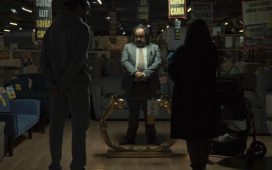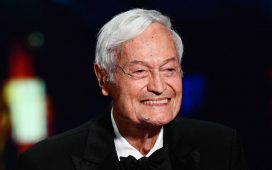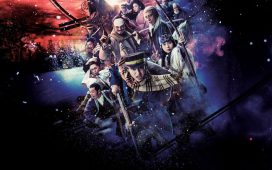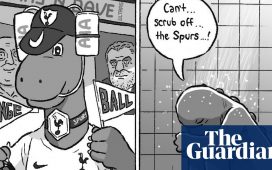Leningrad, the early 1980s: the Soviet Union’s stranglehold on its citizens continues, glasnost is not even a glimmer in Gorbachev’s eye and it feels as if the Party will never end. The one thing that does seem to be thriving, however, is the city’s underground rock scene, albeit one with a crowd stifled by authoritarian apparatchiks. (A fan tries to hold up a homemade sign for her favorite rock band. A man in a suit shuts down this oh-so-revolutionary action down ASAP.) The applause-ometer may never allowed to go above “polite” in the state-sanctioned club, but this is the micro-kingdom that Mike Naumenko (Roman Bilyk) reigns over. The lead singer and guitarist for Zoopark, his band plays a glammed-up version of garage rock that treats the Stones, Stooges and Sex Pistols as the holy trinity. All sunglasses and shag hairdo, Mike is the most charismatic frontman in the Eastern Bloc. Imagine Joaquin Phoenix playing the Brian Jonestown Massacre’s Anton Newcombe. You’re almost there.
“Mick Jagger wouldn’t get you,” someone sarcastically sneers at Mike. “He doesn’t have Natasha,” he replies. That’s his girlfriend and the mother of his child; as played by Irina Starshenbaum, she’s the rock star’s Rock of Gibraltar. Everything seems hunky dory in their world until two men, guitars slung over the backs, waltz into an afternoon beach hang. One of them, Viktor Tsoi (Teo Yoo), turns out to be a hell of a songwriter. Soon, the whole gang is joyfully screaming along to his catchy anti-conformist tribute to beer-swilling “slackers” … everyone except Mike. He doesn’t know whether Viktor is a rival or a worthy protégé. As for Natasha, she’s pretty sure from the moment she bums a smoke from the new kid that she wants to get to know this young, long-haired Bowie obsessive better.
If you know the story of these real-life Soviet-rock icons, then Leto works as a wonderful stream-of-conscious biopic riff, one that’s more interested in tangents than hitting every gamechanging gig and “Eureka!” moment. But it’s almost better if you go into director Kirill Serebrennikov’s nitrous hit of nostalgia cold; it’s easier to concentrate more on the gorgeous, grungy, achingly sad memory piece elements. Filmed in black and white with occasional Kodachrome-ish snippets thrown in maximum remember-when effect — kudos to cinematographer Vladislav Opelyants, who also shot Serebrennikov’s brilliant gut-punch The Student (2016) — this look back at Brezhnev-era below-the-radar rockers brims with the rush of rebellion. The camera likes to circle, tag along and try to keep pace with the characters, as if it’s just another crazy twentysomething high on the illicit narcotic of freedom. Occasionally, people will suddenly, collectively break into song, warbling “The Passenger” or “Perfect Day” or “Psycho Killer” (the latter by, we are told, “Heads That Talk”). The visuals temporarily switch to what you could call Early ’80s Music Video Chic. A bespectacled representation of the repressed Id (Aleksandr Kuznetsov) keeps informing us during these interludes that “This didn’t really happen.”
The whole thing is a blast, which doesn’t mean you don’t sense that the stakes are high or that the tension between this threesome isn’t threatening to smother a great creative collaboration in the crib. When Viktor has to submit his lyrics to the Leningrad Rock Club’s in-house censor, you can feel him chafing. And when Mike convinces her to let his friend’s group play because “they’re a comedy band, very satirical,” you understand that smuggling in these subversives with their cutting folk-rock ditties is the next step in this scene’s evolution. Hearts get broken, and love triangles skew their corners, and people become disillusioned. Some become famous and others learn to be forgiving. But the music must go on.
Leto translates roughly to “Summer”; it not only provides the name of the movie’s breeziest earworm song (“Sun is out, and I’m fried/No money, but I’ve got time/And I don’t need money anyway”) but the sense that a fleeting moment is being celebrated even as its passing quickly by. It’s an ode to the importance of rock and roll as a symbol, a promise, a lifeline in a clamped-down society. And it’s also a valentine to how that forbidden fruit gave a subculture of Soviet youth a sort of tribal identity — a flipped bird to call their own. The fact that Serebrennikov has made such an intoxicating, invigorating movie about freedom percolating under a past toxic regime while having his own rights trampled upon in the present makes the look back that much more ironic. But it doesn’t dilute the joy of experiencing it, one three-chords-and-the-truth number at a time.














